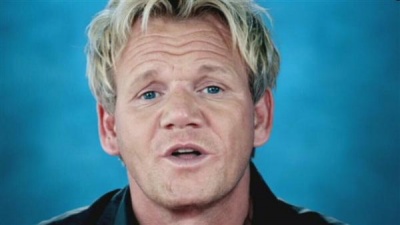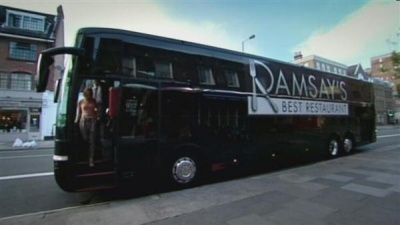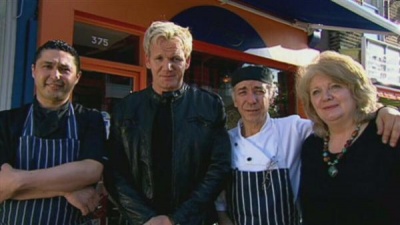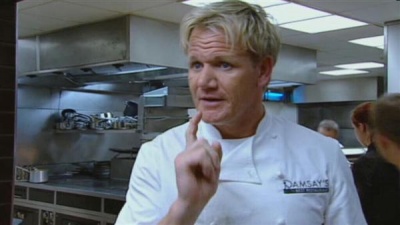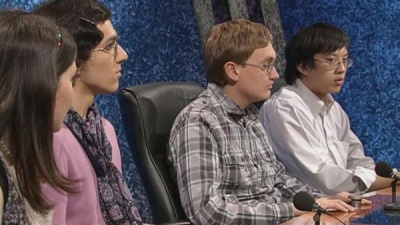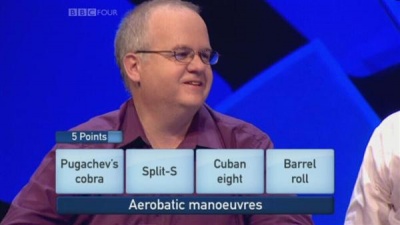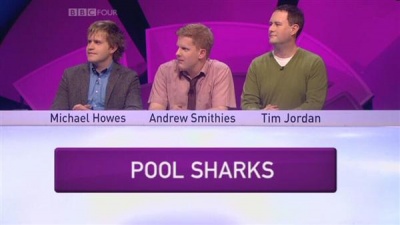Weaver's Week 2010-10-31
Last week | Weaver's Week Index | Next week
"I genuinely liked his cooking." – Michael Winner
Contents |
Ramsay's Best Restaurant
One Potato Two Potato for Channel 4, 9pm Tuesdays
At some point over the last decade, society decided that Gordon Ramsay was the best thing since sliced bread. No, he's better than that, he's the best thing since pain découpé, since diced doughballs. Or something like that. His restaurants collected awards from world-renowned food critics, and even that notorious curmudgeon Michael Winner was actually pleasant towards him. Mr. Ramsay has set himself up as a television chef: he's shouted at celebrities on Hell's Kitchen, he's made documentary Ramsay's Kitchen Nightmares, done live cook-a-longs, and more recently fronted cookery magazine show The F-Word. One of the features on The F-Word was Ramsay's attempts to find a restaurant that met his exacting standards. This little insert has been upgraded to a full series, and that's what we're reviewing here.
The first sample episode we saw went out on 12 October, and featured Thai restaurants. According to the initial blurb, these were the best two from all the Thai restaurants nominated by viewers. Did someone have the job of visiting each and every nomination, and reviewing them for the programme? Was this a ballot by numbers, the most popular entrants won? Was it all arranged to make good television? The criteria for selection are murky; in this post 0898-gate world, judgement by obscure methods does not inspire confidence.
But let's put that aside. Two restaurants have been selected for the programme, and we'll see them both. We'll also see some terrible television clichés: we learn in the second minute that one of the establishments under discussion is located in St Andrews. By the third minute, we've seen shots of people playing golf (apparently, that's popular in Fife), and someone playing the bagpipes next to the beach (as everyone in Scotlandland does every single day). The level of imagination on this show is not inspiring us, and we've still got forty-odd minutes of this to go.
Also in the opening moments, the primary judging criterion has been laid down by Mr. Ramsay: he bandies about the word "authentic" as though he's being paid to promote it, as though if he doesn't insert it into every sentence it'll fall into complete disuse, as though he knows exactly what it means. Or, to be exact, as though we know what he means by "authentic". Authenticity is surely in the eye of the beholder, it depends on exactly who is making the determination, how much experience they've had, on their view of how much variation there is in the type of food being made. Again, it's a woolly judging method, and that doesn't inspire confidence.
But let's put our growing pile of reservations to one side and look at the show. It falls into three segments of unequal length. The first challenge is to cater for a coachload of diners. Thirty people have boarded the Ramsay's Best Restaurant bus, and are going to turn up at one of the restaurants. Two hours later, they're going to go away again. In the intervening time, they're going to want to be fed, and fed from this particular restaurant. Is the dining experience going to be up to it? Can the kitchen cope with lots of orders coming in at once? Will their usually-slick procedures break because they've got to cope with Gordon Ramsay shouting a lot and his camera crew getting in the way?
It's curious how this last possibility is never mentioned on the programme. While the setup of a coachload arriving at once is moderately artificial, it's sufficiently close to reality as to be plausible. Having the television people clogging up the restaurant is entirely abnormal – if they weren't being filmed, the cameras would be absent. Included in this opening section is a brief profile of each restaurant, some of the characters we'll be seeing for the rest of the programme – the chefs, the owners, the front-of-house team. All told, each eaterie gets about ten minutes of screen time.
The footage is edited to make good television – there are lots of shots of dishes moving about the kitchen, some of pans deliberately being set on fire, and some reaction from the visiting diners. If something goes wrong, we'll hear about it – much is made of the one table whose starter arrives late, and nothing of the ten tables where the starter turns up on time. There's great play of people whose chicken isn't properly cooked, and very little of people whose beef is well done. We can understand this to a point – these restaurants are meant to be amongst the best in the country, and the quality of their food can almost be taken for granted. Things going right is almost to be expected, and this is reflected in the majority opinion of the diners.
Round two is where Mr. Ramsay gets sneaky. After the coach party's visit, he sent in an undercover diner, complete with hidden video camera, to record what goes on. Then, he invites the restaurant's people in to discuss the tape. Is it ethical to make surreptitious recordings in this way? There's no tremendous public-service reason to it, so we must assume that permission has been obtained from the restaurants beforehand. Anyway, Mr. Ramsay makes his points, discusses them with the people from the restaurant, and they're dismissed from his presence. All the while, the covers or the spines of some of the books on the bookshelf is blurred out, in a most distracting manner.
All of this brings us to the finale, in which the two chefs come to Mr. Ramsay's restaurant, create a two-course menu, and serve it to an assembled group of guests, all specialists in the chosen field of cookery. This round feels like a slightly re-heated version of the first, with more anxious shots of the food moving about the kitchen, more frantic camerawork in the serving area, and yet more footage of Mr. Ramsay shouting a lot. Though they're meant to be competing against each other, we've not seen the two sides cooking at the same time – first one group does their thing, then the others bake and serve their dishes. After all this, Mr. Ramsay considers the evidence, and declares a winner. They progress to the semi-finals, where they'll play off against other sorts of cookery, and so it goes on.
So, what have we got here? Establishments are selected by an opaque process, they're judged against nebulous criteria, and – when it comes down to it – one man's word will decide the winner. So long as all of this is absolutely clear and properly explained to the viewers, we've no philosophical objection to it being the basis of a television programme. It is, after all, the basis by which The Apprentice has operated for the past five years.
Where we do have an objection is in the veneration of one man as the sole fount of knowledge. It is true that Mr. Ramsay is very good at what he does. It is entirely reasonable that his opinions should be taken seriously, because he knows what he's talking about. But should one man have the power to determine everything? Is Mr. Ramsay the only person whose opinions actually count? He is human, he is fallible, he will make mistakes. That's how he'll learn.
The impression we get from Ramsay's Best Restaurant is that Mr. Ramsay is an omnipotent kitchen god, and the way he deems to be the right way is automatically correct. No room for argument, no chance of criticism, it's Mr. Ramsay's way or the highway. If, as happened on this week's show, the judge insists that a chef delegate some of the work, then that's what he'll mark on. Even if the food is poorer as a result.
We've no doubt that Mr. Ramsay is a good deal more humble than all that, he acknowledges that he's not perfect, that there is room for improvement in his own work. Such self-critical reflection doesn't sit easily in the contemporary television market, where commissioners are looking for swift resolutions and easy access to all knowledge. That doesn't reflect real life, where learning is often an incremental, almost imperceptible process.
At the heart of Ramsay's Best Restaurant is a dilemma: how to make an attractive television programme for mass consumption about a contemplative activity that can only be judged by an individual. For this column's money, the tension has been resolved far too strongly in the favour of making good television. We see the result, but it's never quite clear what Mr. Ramsay's reasons were. On the positive side, the producers have made a very attractive television programme, and it's interesting enough for us to want to see the final. Whether we'll see the semi-final immediately before it, that's another question.
University Challenge
Repechage 2: St Andrews v St John's Cambridge
The first and last re-join us this week. St Andrews lost the first match of the series, going down 190-185 to Bristol back on 5 July. Cor, remember when Voodoo Hussy hadn't reformed? St John's Cambridge succumbed to Merton Oxford by 180-175 a whole two weeks ago. Cor, remember when Wayne the Potato wanted to leave Manchester? One slight change on the St John's Cambridge side, Mark Wilson has moved to seat two, with Caroline Tecks now on seat four.
In the original scheme of things, had the golf not been rained off, this programme would have gone out last week. The opening question would have neatly coincided with this column's theme of the week: "genius". That goes to St Andrews, but the Cambridge side have the "key" question, and score perfectly on abbreviations from the Current Financial Crisis. Remain indoors! St John's have the better of the subsequent exchanges, but St Andrews pick up the first visual bonuses. It's a map showing streets on the UK Monopoly board, and it's illustrated by some of the actual pieces. St John's leads by 55-35.
St Andrews pick up a starter on early winners of one of the Nobel prizes. We had one of those on Brain of Britain earlier, but it's a different category. The Scots do well on their knowledge of Swedish writers, and take the lead with the following starter; they're less well suited to questions on modern dance compositions. St John's move ahead with crater questions, and further ahead with the cold fusion mistake of 1989. Cor, remember when Kylie Minogue had hit singles? This brings us to the audio round, a deliberate Hidden Transmission Indicator, on posthumous hit singles, introduced by the music of John Lennon, who would have been 70 last week. It's spoiled not only by the golf but also by the fact that no-one knows one of his most well-known hit singles. So it's not well-known at all. St John's leads by 85-65.
St Andrews eventually get these bonuses, St John's a set on African tribes, and a nifty starter on the history of the Second World War. We noted in the heat that they were delaying badly during the bonuses and seemed to be conferring during the starters; while they're not perfect on these fronts tonight, they're certainly better. St Andrews' Tagore Nakornchai rubs his hands together when asked about Great Mathematical Theorems Recently Proven, and gets one of the three for the team. The second visual round is Name That Aviator, it goes to St John's, and they lead by 150-95.
It's not quite game over, but it might be nearing a conclusion. But St Andrews pick up a starter about different meanings of "1/4", two of the bonuses, and they're pack in the game. The Scottish sides also get a starter about postcodes of the Queen's residences, and are perfect on Jean-Paul Satre. St John's must have been within microseconds of being timed out on a starter to which the answer was "arsenic", but answer just in time. One more starter, some bonuses along the way, and the gap's moved up from 10 to 45.
Flags coloured red and yellow give St Andrews a set of bonuses on elasticity, which doesn't help. There's a question escaping from Only Connect, on 7!, 6!, 5!, and 4! is 24 and ten points and possession to St John's. They don't do much on the bonuses, but when the Cambridge side gets the next starter, we're scribbling Game Over. 65 in two minutes is just too much. Not that St Andrews aren't going to give it a good go, answering at a massive clip and passing as soon as they don't know. It's all in vain, at the gong St John's Cambridge have won it by 225-165.
Tagore Nakornchai scored six starters in St Andrews' cause, the side had 14/30 bonuses and one missignal. Seven starters for Mark Wilson helped St John's to the win, they went 19/36 on the bonuses; the night's overall accuracy rate was 56/92.
Next match: Christ's College Cambridge v Edinburgh
Only Connect
Series 4, heat 8: Alesmen v Pool Sharks
Is that a connection in the BBC4 presentation department, following a trailer for Birds Britannia with the "birds" ident? Chris Quinn, Graham Barker, and captain Mark Kerr form the Alesmen, and Mr. Kerr was the winner of Britain's Brainiest Estate Agent in the last decade. They're real ale fans; the Pool Sharks are Michael Howes, Tim Jordan, and captain Andrew Smithies. The Sharks say they've got lots of specialisms.
Round one looms into view, the Alesmen won the toss and elected to bat, and have some equations to deal with; put "Adam's" in front and two points come out. Pool kick off with the picture clue: a guinea pig, Chinese checkers, a Panama hat — a-ha! All named after countries, but that's not precise enough; they're all named after the wrong country. Guinea pigs don't come from Guinea, and so on. Bonus point to the alesmen, who start with a deep discussion of "Pugachev's cobra". They're not. They are! They really are!!! On one clue, ONE CLUE, they're going for it. And they're right!!!!!1!! FIVE POINTS!!!!!!!!!!!!eleven!!!
Follow that! Pool Sharks have Tux and Sam Sawnoff. Cartoon characters? Feathers McGraw. They're grasping for the link, it's not alter egos of Warner Brothers, but penguins – Tux is the mascot for Linux, Feathers was a friend of Wallace and Grommit, and Alesmen p-p-pick up a b-b-bonus. On their own question, the Alesmen take the luxury of two clues, all on lollipops, so three there. Pool Sharks are left with the audio question – Teddy Bear's Picnic, Land of Hope and Glory, something else, and Anita Dobson massacring the theme to The Eastenders. Theme tunes to television shows? No, blast. They're songs where words were added to existing music. No points there, the Alesmen have scored 12 (TWELVE) in the opening round.
Alesmen start round two with a Jerk, then Acceleration, then they expect to see Velocity, so Displacement (or distance, or position) is the answer, and another three points. Pool are going to get some money: £1, 20p, 1p, and they're guessing 5p. It's the right answer, UK coins by diameter, and two points. Alesmen have one skull, two scapulae, er, two patellae, and are guessing wildly. Phalanges, as offered by the Pool, is right; it's Heads Shoulders Knees and Toes in an anatomically correct version.
Cole, Oakley, Marr has the Pool Sharks thinking of Johnny Marr, so Morrissey Smith, but no. Alesmen pick up Robinson, on the grounds that it's BBC political editors since the days of John Cole and his remarkable gabardine coat. Bonus for the Alesmen, who promptly start the visual round with Sylvester the Cat, Paul McCartney, St Christopher, so who comes next? Popes? Stephen? Couldn't be more wrong. It's Michaelangelo's David, because these are people who played CBBC's famous Dr Who. In the last question, Rutlish Grammar and Fettes gives the hint, it's Prime Minister's schools. Other quiz programmes ask who the prime minister of the day is, Only Connect asks: where did they eat their school lunches.
Pool Sharks trail by 16-7 going into the walls. Instantly, they pick out a set of four eels, and start thinking about explorers and scientists. Or people from New Zealand, that could work. What's left? Areas in Scotland, and the standout clue "Engineer". The others look like cricketers, wicket-keepers to be precise. That's rather good going. Ten points!
Alesmen need to do something to retain their lead, and begin by working on various types of spaniel. People called Jerry? There are four people called Jerry in there, and there are also four islands around the UK. There have to be four spaniels, and four terms that can be prefixed by magnetic. Another perfect round. Ten points!
As you were, Alesmen lead by 26-17. Mssng Vls finishes the game tonight, beginning with kitchen gadgets. That's a slow round, eventually a 2-1 win to the Sharks. Types of drama is a 2-2 draw, and Supernatural creatures goes to the Sharks 4-0. Only four points in it. Occupations that Mr Benn tried is a 2-1 win for the Alesmen. Ancient languages ends up 1-1, and Parts of an aircraft also finishes 1-1.
End of the show! The Pool Sharks rose to 28, but the Alesmen scored 33 and are the winners. An excellent recovery from the Sharks, but not quite good enough.
Next match: Epicurians v Bridge Players
Mastermind
Heat 11
"The rules are simple", says the host. There are reasons why this is.
First up tonight is Hazel Humphreys, and she's taking the Life and Career of Richard Pryor (1940-2005). Born in Peoria, where something will clearly play, Pryor was a comedian famed for his free-form, and often profane, stand-up routines. He won an Emmy award for his writing on "The Lily Tomlin Special", but his own NBC television show was cancelled after five episodes. Drug abuse blighted his career, and multiple sclerosis ended it in the mid-1990s. Nothing much blighting this round, it ends on a very fine 13 (1).
Tony Wheeler will be discussing the Louie Knight novels of Malcolm Pryce (2001-). The books – there are currently six in the series, starting with Aberystwyth Mon Amour – tell tales of private detective Louie Knight and his efforts to tame the criminal underclass of his home city. This is Aberystwyth, previously best-known as home to the National Library of Wales, and going to sleep at about 8pm. According to Pryce's website, the books were written in Bangkok. The books themselves are a pastiche of detective novels; there's nothing pasty about this round, 15 (1).
Peter Reilly will run with the Grand National since 1960. The wooden rollercoaster was installed at Blackpool Pleasure Beach in 1935, and consists of a Mobius design – two separate tracks, with a crossover partway through, on which two cars race to the finish. The amusement has been remarkably influential on popular culture, lending its name to a greyhound and a horse race. It's on the last of these that the contender has asked for questions, with mentions for Foinavon, Red Rum, the false start, but not that well-known orthodontist Clare Balding. The round ends on 15/1. Decent odds!
Mike Foden is going to tell us about the Life and Works of Robert Doisneau (1912-94). Born in Gentilly, Doisneau studied engraving, then took up photography, where his images of life won him awards and commissions from all the leading photographic magazines. The round goes a little over our head, and finishes on 10 (1).
Mr. Foden is back after the scorecheck, and kicks off with the shamrock, the autopsy, and the Politburo. Answers are a little slow to come in this round, and the final score is 20 (7).
Hazel Humphreys begins with Pinocchio, the television watershed, and the 1979 invasion of Cambodia. Wasn't that by Simon Groom and the forces of Blue Peter? Seventy five thousand packs of cards this year, remarkable work. Er, we digress. Captain of the ship in Moby Dick? Easy. The round slows a little towards the end, and finishes on 21 (2).
Mr. Wheeler remembers the characters on Minder, and knows the date that L-plates were introduced. No-one remembers the independence claims of Biafra, nor the last native Manx speaker. There's a question about Bonfire Night parties, which leads us to wonder if this show is going out a week early, and the round concludes on 25 (3).
Mr. Reilly needs eleven to win, and kicks off with the definition of interest, the works of Richard Dawkins, Tom Petty's backing band, and the concept of camouflage. There's mention of Bugsy Malone and the grey squirrel, but the round stalls for a long time at 24 points. Then top travel show Lost gets him going again, past the winning post, and finishing on 27 (4).
This Week And Next
Nominations are out for the BAFTA Children's awards, to be presented by Barney Harwood on 28 November. The Entertainment category is a game show zone – Escape from Scorpion Island, Junior Masterchef, Relic - Guardians of the Museum, and Undercover Dads cover all four bases, and Election: Your Vote is up in the Factual category. We've very surprised that Mission 2110 isn't nominated in the Interactive category, or that no game shows have made the cut in the children's webvote, but pleased to see that Richard Hammond might retain his BAFTA for best Presenter. Channel of the Year will be fought between CBBC, CBeebies, Cyw, and Milkshake!.
We're pleased to report that Channel 5 has paid its bills to Shine Productions for the recent series of Don't Stop Believing. We're somewhat less pleased to read in the new edition of Private Eye that the television channel is trying to insert a ratings-related clause into its new contract. Ian Hislop's organ claims that Big Brother producers Endemol walked away from negotiations when Channel 5 said they'd only pay the full amount if the show recorded a certain level of viewers. Which is more valuable: two million viewers of Big Brother, or fifty thousand watching the n-millionth repeat of Law and Investigation Albuquerque.
BBC1's summer filler 101 Ways to Leave a Gameshow [sic] has been taken off air. In a fitting tribute, the remains of the format were crushed into a ball, bundled into the drum from a dismantled washing machine, attached by a bungee rope to a catapult, and fired into the air, before landing safely in the swimming pool. It's clear that the programme was the first to operate entirely in binary, as it offered five different ways to exit the programme. We hope the winner's cheque was for more the princely sum of £10,000 (sixteen quid).
Channel 4 screened the second series of The Million Pound Drop Live this week. We've a few quibbles: the obsession with young people is getting to be a bit wearing. It's almost as if there are no quality quizzers over the age of 33. Variety is the spice of life, as later series of Big Brother showed. We're not impressed with the integrated commercials – one question was an extended advert for an underwear company. The show is live, but we feel that the audience interaction can really be beefed up: might we have quick chats with some of the players at home rather than meaningless statistics? "The 70-79s are doing really well" is the sort of insignificant nonsense we thought had died with Test The Nation The National Testy Test.
One set of contestants tried to list winners of The X Factor, starting with the most recent. "Er, wotsisface." You know, him. The man appeared on the results show three weeks ago, promoting his new single (number 6 two weeks ago, expected to be out of the top 20 by nightfall) and album (released in half-term week, and still didn't make number one). How soon the country forgets the remarkably talented person who won last year's competition, but that's showbiz, chewing people up and chucking them on a scrapheap. Just don't bang your leg on π, that would hurt.
Worst of all, one of the questions was remarkable for its imprecision. "Which of these places had sunset first today: Dubai, Reykjavik, or Rome?" Entertainingly, all three answers to the question can be correct, depending only on how one interprets the words.
If the question is to be read "which of these places experienced sunset first on 27 October, as seen by an alien 23,000 miles due up", the answer is Dubai. If the question is "which of these places experienced sunset first on 27 October, as measured by local time", then Reykjavik is your answer. At the time of asking, Dubai had clicked over to 28 October, and sunset "today" was still sixteen hours in the future, so "which of these places experienced sunset first today" was Rome. No comeback for those contestants, we just got BBLB's Useless Bloke and an actor from The Eastenders playing for charity, getting suspiciously easy questions, and walking out with £50,000. Can't we have some proper stars, like Knitted Character and Peter the Duck?
As you were in the ratings to 17 October: 13.4m see Simon Cowell, 9.65m Bruce Forsyth, and 8.1m Alan Sugar; that's the year's best for both BBC shows. The return of HIGNFY pulled in 5.7m people awaiting the first joke of the new series, and 5.2m saw The Cube. Masterchef The Professionals attracted 3.35m to BBC2, ahead of University Challenge (3.1m) and The Apprentice You're Fired (2.7m). Channel 4's biggest hit was Come Dine With Me on Thursday teatime, 2.45m there; Ramsay's Best Restaurant was seen by 1.7m live, and a further 325,000 an hour later. Channel 5 did not show a hit game show, so no change there.
HD leaders were Cowell (970,000), The Apprentice (530,000), and Strictly (485,000), all recording their biggest HD scores of the year. On the regular digital channels, Celebrity Juice had 1.24m viewers on Thursday night, The Xtra Factor 995,000, and Come Dine With Me has 825,000 on More4. Hell's Kitchen on ITV2 (535,000) just managed to beat Only Connect on BBC4 (525,000), and both were ahead of America's Next Top Model on UK Living (455,000).
Next week is quiet: highlights include Chris Moyles' Quiz Night (C4, 10pm Monday), and the grand final of 71 Degrees North (ITV, 9pm Tuesday), and, er, The Love Bus on Fiver (5.25 tonight), and, er, that's about it. Talent show times for next Saturday: Strictly 6.15 - 7.40, X Factor 7.45 - 9.30.
To have Weaver's Week emailed to you on publication day, receive our exclusive TV roundup of the game shows in the week ahead, and chat to other ukgameshows.com readers, sign up to our Yahoo! Group.


